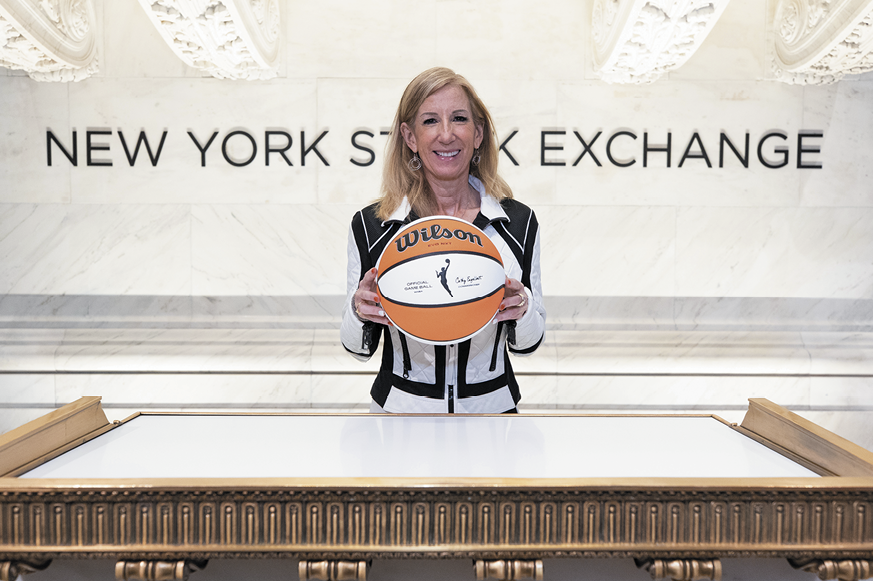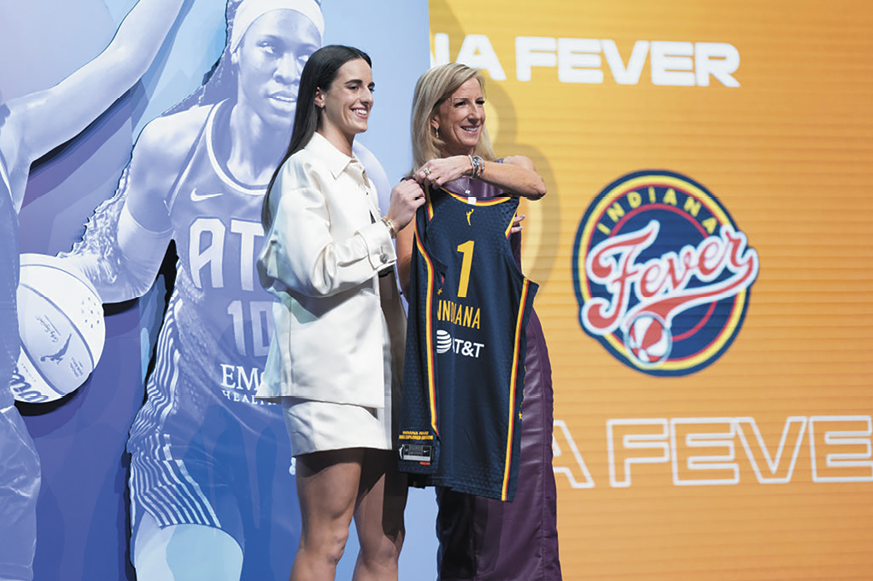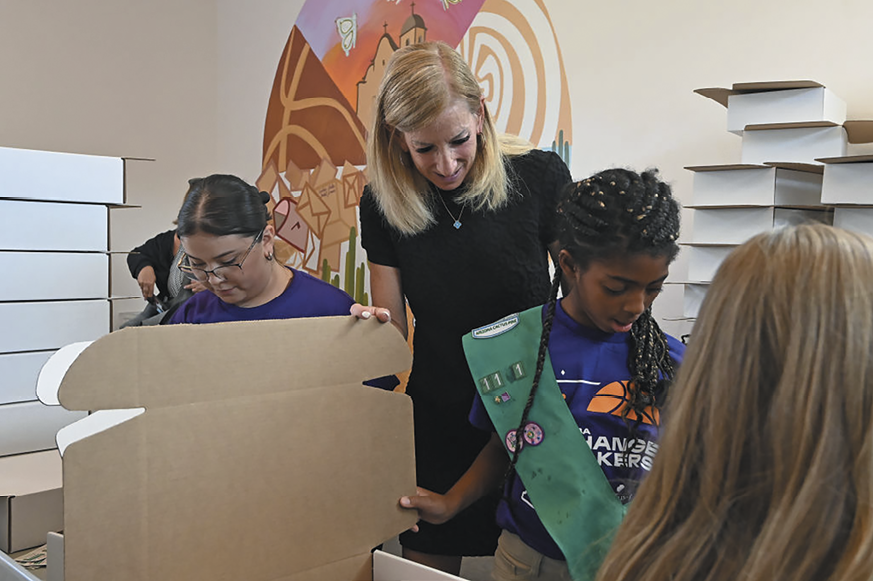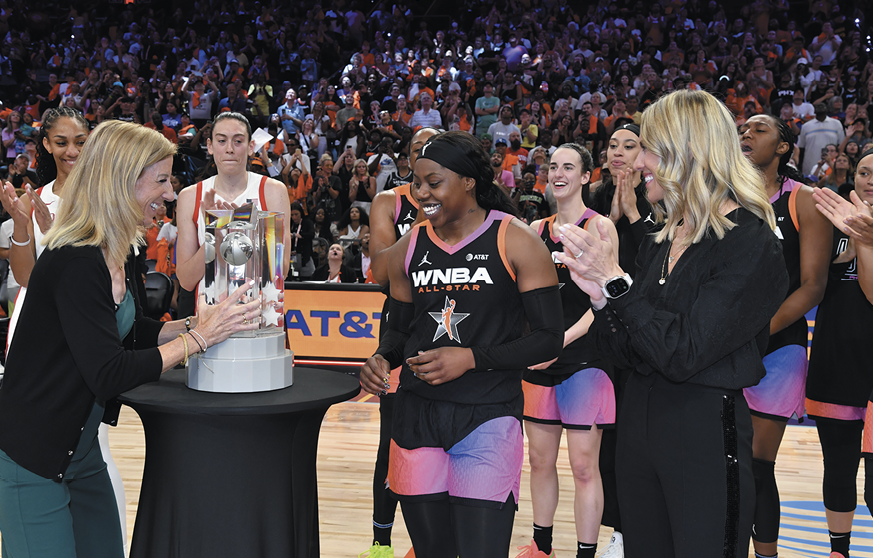- Home
- Media Kit
- MediaJet
- Current Issue
- Past Issues
- Ad Specs-Submission
- Reprints (PDF)
- Photo Specifications (PDF)
- Contact Us
- PRIVACY POLICY
- TERMS OF USE
![]()
ONLINE
![]()
ONLINE

Growing The Game
Editors’ Note
In July 2019, Cathy Engelbert was named the first-ever Commissioner of the WNBA and is charged with bolstering visibility for the sport of women’s basketball and leading the business through transformation. Since she stepped into the role of WNBA Commissioner, she has executed a historic player-first Collective Bargaining Agreement in 2020; built and socialized a new economic framework to drive league revenue growth and stakeholder success; led the longest tenured women’s professional sports league in the U.S. through its 25th anniversary season and through the COVID-19 pandemic; and, raised $75 million capital from outside investors to fund league transformation projects. Prior to the WNBA, Engelbert retired as the CEO of Deloitte in June 2019, after 33 years with the firm. Engelbert is a member of the Board of Directors of McDonald’s Corporation, Royalty Pharma, and the USGA Executive Committee. She also serves as the Vice Chair of the Partnership for New York City and is a member of the Business Council, Council on Foreign Relations, and Catalyst, a global nonprofit organization that promotes inclusive workplaces for women. She has been listed as one of Fortune’s Most Powerful Women for four consecutive years, was ranked on Glassdoor’s annual Employees’ Choice Awards honoring the 100 Highest Rated CEOs, and is one of Fast Company magazine’s Most Productive People. In 2021, Engelbert was listed on the Forbes’ “50 Over 50” list and Adweeks “40 Women to Watch.” She has two children – earning her the recognition as one of Working Mother magazine’s 50 Most Powerful Moms for three years. Engelbert received a BS degree in business and economics (accounting) from Lehigh University.
Organization Brief
The Women’s National Basketball Association (WNBA) is a bold, progressive basketball league that stands for the power of women. Currently in its 28th season in 2024, the WNBA (wnba.com) is a unique sports property that combines competition and entertainment with a commitment to diversity, equity, and inclusion and social responsibility. Through its world-class athletes, the in-game fan experience, TV and digital broadcasts, digital and social content, and community and youth outreach programs, the league celebrates and elevates the game of basketball and the culture around it. In 2020, the WNBA and the Women’s National Basketball Players Association (WNBPA) signed a groundbreaking CBA that has charted a new course for women’s basketball – and women’s sports overall – with a focus on increased player compensation, improvements to the player experience, expanded career development opportunities and resources specifically tailored to the female professional athlete. Key elements of the agreement are supported through the league’s partnership platform, the WNBA Changemakers Collective, with AT&T, the WNBA’s Marquee Partner and inaugural Changemaker, as well as fellow inaugural Changemakers Deloitte and NIKE, Inc., and subsequent additions Google, U.S. Bank and CarMax. During the 2020 season, the WNBA and WNBPA launched the WNBA Justice Movement forming the Social Justice Council with the mission of being a driving force of necessary change and continuing work regarding women’s and maternal health and voting rights, among other important societal issues.

Cathy Engelbert rings the Opening Bell at the
New York Stock Exchange in May 2024
When you look back five years ago when you were presented with the opportunity to lead the WNBA, what excited you about the opportunity and made you feel it was the right fit?
When my term as CEO of Deloitte was ending, I wrote down three things I wanted in my next role. I wanted something different, something with a broad women’s leadership platform, and something I had a passion for. Sports have always been part of my upbringing; my dad was drafted into the NBA in 1957, and I played both basketball and lacrosse in college. The opportunity to be the Commissioner of the Women’s National Basketball Association truly checked all three.
The WNBA was looking for someone at the time to transform the economics of the league so my experience as the first female CEO of a Big 4 accounting firm and over three decades in the business world gave me experience and capabilities to help the WNBA transition from surviving to thriving. I also saw the opportunity to be a part of something truly special and impactful. As a fan, I knew the WNBA’s product was top-notch and the players were the best in the world, and I was so excited to join the WNBA and help take it to the next level.
“The WNBA has an immense responsibility to be engaged in its communities and act as a force for good. WNBA players are powerful advocates for social justice, equality, and community service.”
How did your experience as a business leader help prepare you for the role of commissioner?
I was brought on to lead the WNBA because the skills and expertise I brought on as a CEO are highly transferable because, after all, sports is big business and big business is about relationships. The 30-plus years I spent working in the corporate world, including as a professional services partner and then CEO, prepared me to help transform the WNBA’s business and economic model. These decades of experience taught me the importance of building relationships, fostering innovation, navigating complex challenges, deploying capital, crisis management, hiring a strong team, and building strong stakeholder relationships. These skills have been instrumental in driving the growth and success of the WNBA.

Caitlin Clark poses for a photo with Cathy Engelbert
during the 2024 WNBA Draft on April 14, 2024
What have been the keys to the success that the WNBA has achieved in bolstering visibility for the sport of women’s basketball?
The keys to our success in increasing visibility for women’s basketball include strategic partnerships, innovative media deals, and a focus on engaging, authentic storytelling. But it also was about getting more WNBA games on national platforms, signing on more corporate sponsors who have in turn endorsed WNBA players and placed them in advertising spots, and the raising of outside capital so we could hire a strong team to effect the multi-dimensional transformation of the league. We’ve signed significant media rights agreements, including groundbreaking ones this summer with Disney, Amazon, and NBC. We have also made significant investments in digital media and technology to amplify the league’s presence through digital platforms, social media, and our WNBA app. Additionally, our significantly enhanced marketing efforts have centered on compelling storytelling around the incredible on-court talent and off-court impact of the players. This has clearly resonated with fans, as our players and the league are cultural touchpoints for people across age, gender, and demographic lines, and we have driven record-breaking viewership and engagement during the 2024 season to date.
You have placed a major focus on empowering the players in the WNBA. Will you discuss this effort?
We have never shied away from taking a stand and empowering the players to do the same. Since its founding, the WNBA and the players have been outspoken on issues including civic engagement and voting rights, LGBTQ+ rights, racial justice, reproductive rights, and more. The players are role models in their communities and committed to making an impact beyond the court. We recognized this and knew our job as a league is to empower them to amplify this impact. Not only do we encourage our players to be pillars of their communities, but we provide resources and platforms for them to engage in social justice initiatives, community outreach, and personal development programs. Initiatives like the WNBA’s Social Justice Council and league-wide community service projects enable our players to advocate for causes they are passionate about.
How has the WNBA approached its focus on enhancing fan engagement?
Enhancing fan engagement has been a multifaceted effort. Our guiding principle is to make it easier to be a fan of the WNBA. Central to this work has been a significant investment in creating more interactive and accessible experiences for our audience. We’ve expanded our digital footprint with a total overhaul of the WNBA app, increased our social media presence, and hosted innovative in-season competitions like the Commissioner’s Cup to generate excitement. Additionally, we’ve worked to bring fans closer to the game. This year, fans were able to attend the draft, and we executed preseason games in new markets.

Cathy Engelbert attends WNBA Changemaker Day on
July 18, 2024 at The Parsons Leadership Center
for Girls and Women in Phoenix, Arizona
How important has it been for the WNBA to build a diverse and inclusive workforce to mirror the diversity of its players and the communities it serves?
Building a diverse and inclusive workforce is crucial for the WNBA, reflecting our commitment to equity and representation both on the court and beyond the game. Our league thrives on the diversity of the players, and it’s imperative that our staff and leadership embody the same values. This approach not only fosters a more inclusive environment, but also ensures that we can connect authentically with our diverse fan base and drive meaningful impact within the communities we serve.
While there is always work to be done, the WNBA has continued to post top-tier grades in an annual report studying diversity hiring throughout the league. The Institute for Diversity and Ethics in Sport (TIDES) at the University of Central Florida issued an A for the league’s overall racial and gender grades for the 2023 season. This year’s report card marked the 19th straight year that the league earned at least an A in all three categories. The league also posted an A in racial hiring and an A+ in gender hiring for roles in the WNBA headquarters, along with an A+ for diversity-hiring initiatives.
What do you see as the WNBA’s responsibility to be engaged in its communities and to be a force for good in society?
The WNBA has an immense responsibility to be engaged in its communities and act as a force for good. WNBA players are powerful advocates for social justice, equality, and community service. Sports are a convening and unifying force, bringing together diverse groups of people and fostering a sense of community and shared purpose. The WNBA leverages this power to address critical social issues, promote justice, and inspire positive change. Through league-wide initiatives, partnerships, and community engagement programs, we aim to empower the next generation of leaders and athletes, ensuring they see the possibilities within themselves and in their communities. By supporting our players in their advocacy and outreach efforts, we help amplify their impact, creating a ripple effect of positive change throughout society.
Players also have immense capacity to make a profound impact on gender equality. They serve as critical role models for young girls, inspiring them to participate in youth basketball or other sports, and demonstrating the strength, resilience, and determination that come from participating in competitive sports. Speaking from both personal experience and backed up by research, we know that girls who play competitive sports are more likely to be successful later in life, as athletics instill valuable life skills such as teamwork, leadership, and confidence. It’s our duty to continue expanding our players’ platforms and visibility so they reach as many young people as possible.

Arike Ogunbowale of Team WNBA receives the
2024 AT&T WNBA All Star Game Most Valuable Player trophy
after the game against the USA Basketball Women’s National Team
What do you feel are the keys to effective leadership and how do you approach your management style?
Effective leadership hinges on vision, authenticity, empathy, and resilience. I believe in leading by example, fostering a culture of collaboration, and being open to new ideas and perspectives. My management style is rooted in empowering others, providing clear direction while also giving teams the autonomy to innovate and excel. Building strong relationships and maintaining transparent communication are essential to navigating challenges and driving success.
With all of the growth and success that the WNBA has experienced under your leadership, are you able to enjoy the process and take moments to celebrate the wins?
Absolutely, celebrating our wins is essential to appreciating the journey and staying motivated. The rapid growth of the WNBA is the direct result of hard work, dedication, and passion from everyone involved – the players, the teams, the league, our partners, and our fans. Taking moments to reflect and celebrate these milestones not only fosters team spirit, but also inspires us to aim even higher. Whether it’s a new viewership record, a runaway success in the All-Star Game, or an impactful new partnership, each victory is a testament to our collective effort and vision for the league.
What are you most excited about when you look to the future of the WNBA?
I am incredibly excited about the WNBA’s expansion from 12 teams to 16 teams by 2028, and the growing visibility of, and demand for, women’s basketball. The future holds immense potential as we reach new markets, increase our media presence, and enhance fan engagement globally. The talent pool in women’s basketball has never been deeper, and we are committed to creating more opportunities for more players to showcase their skills and thrive. The next few rookie classes show amazing talent and promise, and we look forward to welcoming in these players who continue to change the game through their incredible skills and appeal to a broad audience. Additionally, our ongoing efforts to globalize the game, and innovate and lead the way in how women’s sports can drive equity and inclusion, make me optimistic about the WNBA’s role in shaping not just the future of sports, but of our society.![]()